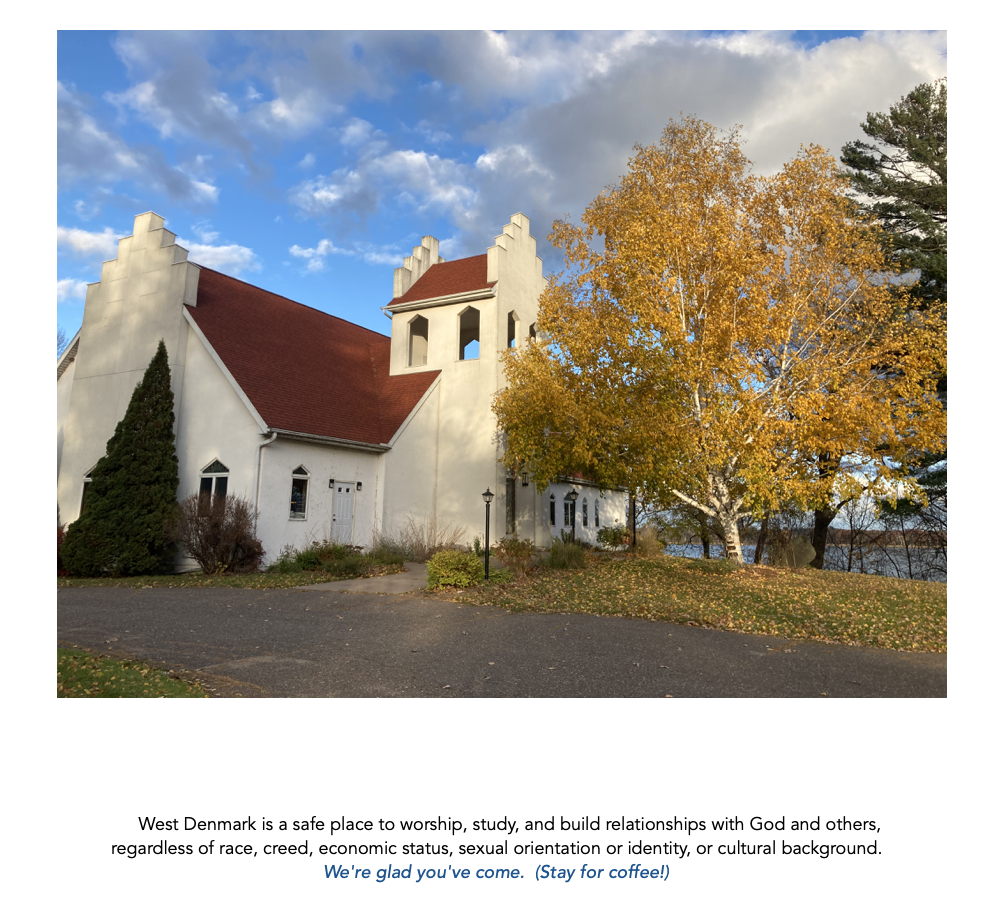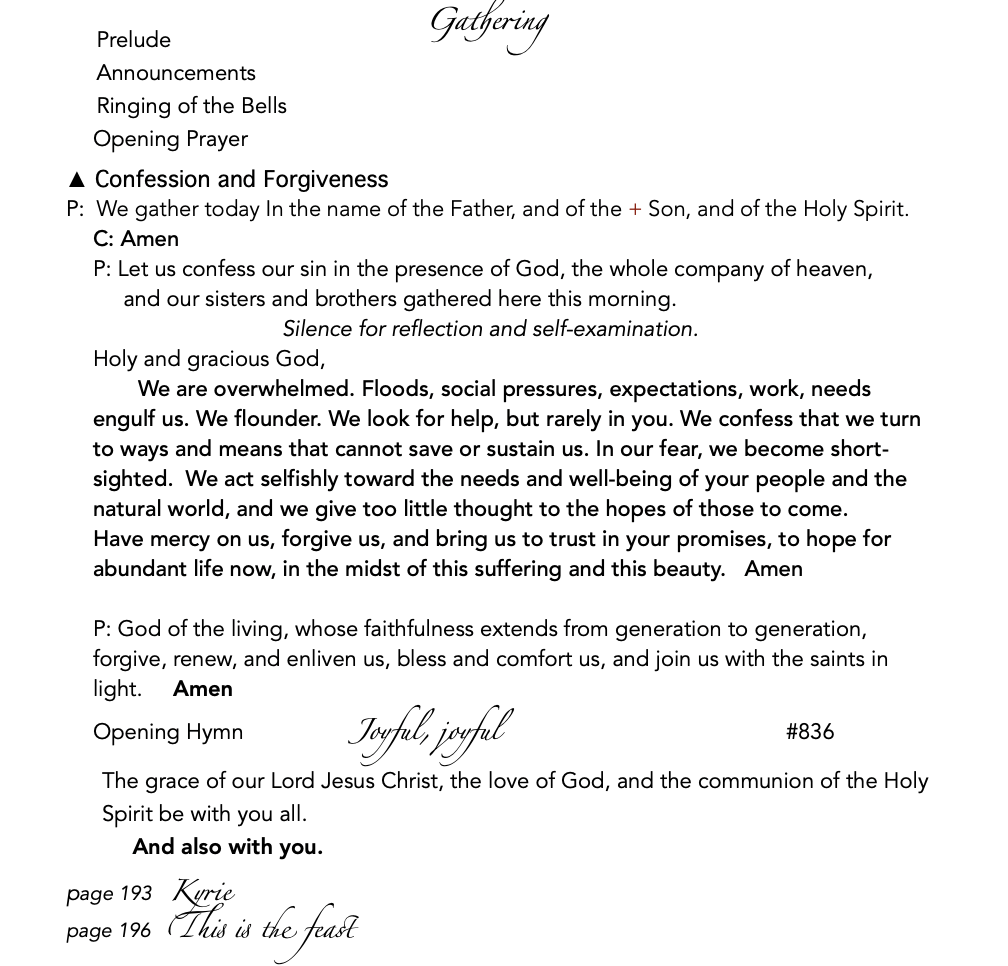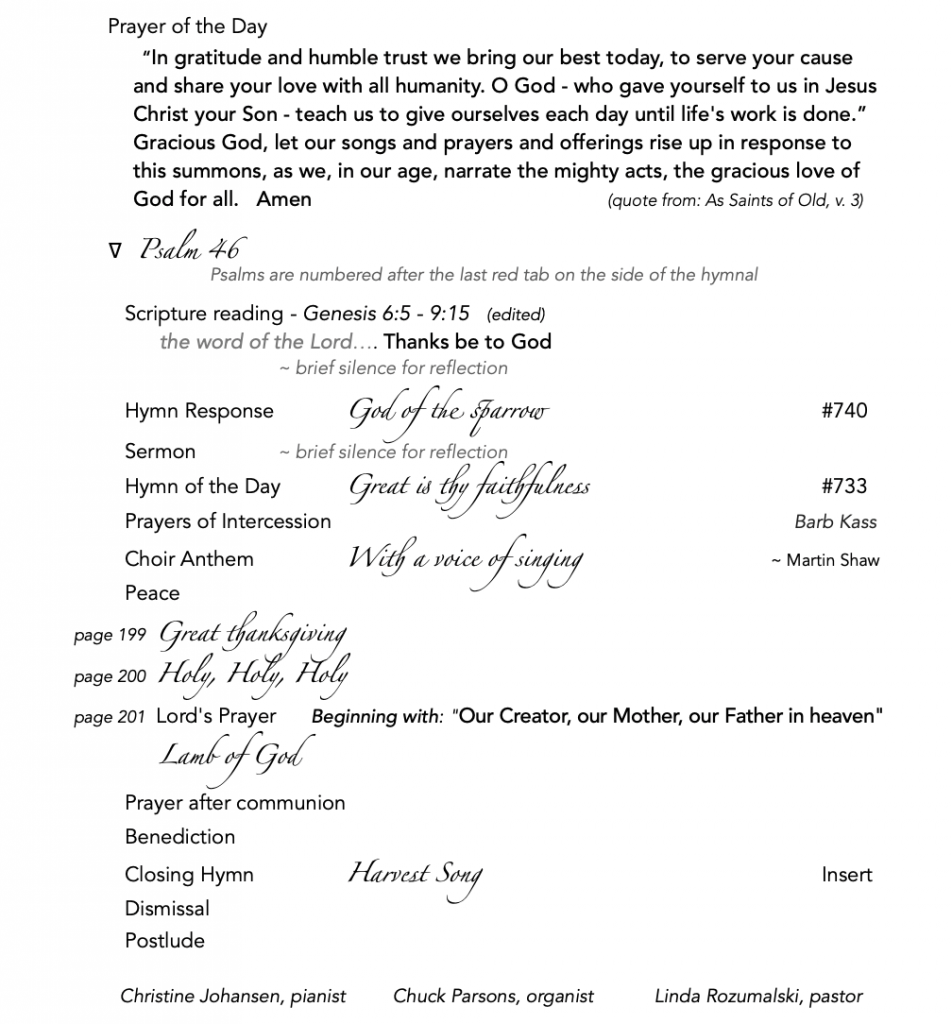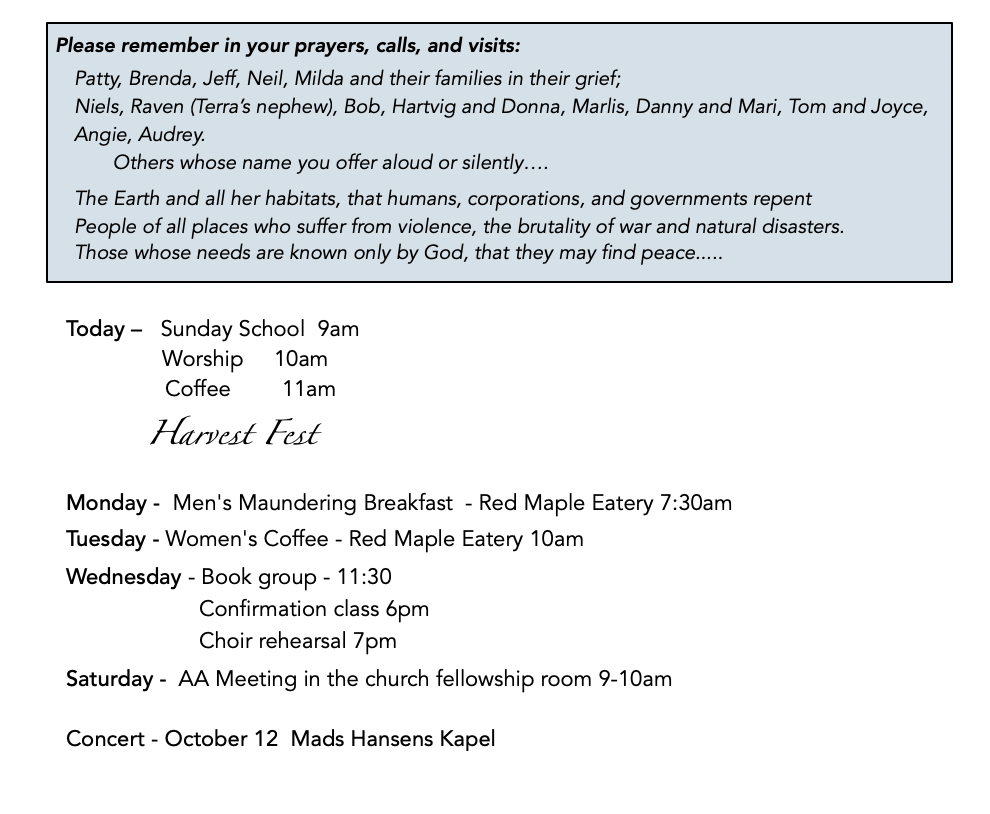


Genesis 6:5 – 9:15 edited
The earth was corrupt in God’s sight, and God saw that the earth was filled with violence, and that every inclination of the thoughts of human hearts was only evil. And the LORD was sorry that he had made humankind on the earth, and it grieved him to his heart. So the LORD said, “I will blot out from the earth the human beings I have created — people together with animals and creeping things and birds of the air, for I am sorry that I have made them.”
But Noah found favor in the sight of the LORD.
And God said to Noah, “I have determined to make an end of all flesh, for the earth is filled with violence… Make yourself an ark of cypress wood; make rooms in the ark, and cover it inside and out with pitch. Make a roof for the ark, and put the door of the ark in its side; make it with lower, second, and third decks.
“For my part, I am going to bring a flood of waters on the earth, to destroy from under heaven all flesh in which is the breath of life; everything that is on the earth shall die.
“But I will establish my covenant with you; and you shall come into the ark, you, your sons, your wife, and your sons’ wives with you. And of every living thing, of all flesh, you shall bring two of every kind into the ark, to keep them alive with you; they shall be male and female. Of the birds according to their kinds, and of the animals according to their kinds, of every creeping thing of the ground according to its kind, two of every kind shall come in to you, to keep them alive. Also take with you every kind of food that is eaten, and store it up; and it shall serve as food for you and for them.”
Noah did this; he did all that God commanded him.
[Then] the fountains of the great deep burst forth, and the windows of the heavens were opened. And rain fell on the earth forty days and forty nights. The waters swelled above the mountains, covering them. And all flesh died that moved on the earth, everything on dry land in whose nostrils was the breath of life died. He blotted out every living thing that was on the face of the ground… Only Noah was left, and those that were with him in the ark. And the waters swelled on the earth for one hundred and fifty days.
8:1 But God remembered Noah and all the wild animals and all the domestic animals that were with him in the ark. And God made a wind blow over the earth, and the waters subsided; the fountains of the deep and the windows of the heavens were closed, the rain from the heavens was restrained, and the waters gradually receded from the earth. At the end of one hundred fifty days the waters had abated; and in the seventh month, on the seventeenth day of the month, the ark came to rest on the mountains of Ararat.
Then God said to Noah, 16“Go out of the ark, you and your wife, and your sons and their wives. 17Bring out with you every living thing that is with you so that they may abound on the earth, and be fruitful and multiply.”
Then Noah built an altar to the LORD, and offered burnt offerings on the altar. 21And when the LORD smelled the pleasing odor, the LORD God said in his heart, “I will never again curse the ground because of humankind, for the inclination of the human heart is evil from youth; nor will I ever again destroy every living creature as I have done.
9:8 Then God said to Noah and his sons, “As for me, I am establishing my covenant with you and your descendants after you, and with every living creature that is with you, the birds, the domestic animals, the wild animals, and every animal of the earth with you, as many as came out of the ark. God said, “This is the sign of the covenant that I make: I have set my bow in the clouds, and it shall be a sign of the covenant. When I bring clouds over the earth and the bow is seen in the clouds, I will remember my covenant that is between me and you and every living creature of all flesh; and the waters shall never again become a flood to destroy all flesh.”
A word of the LORD our God,………. thanks be to God.
It seems amazing that we teach this story to our children. In so many ways it is a terrible tale. But, like the stories of old, it is a great and fearsome tale of mythic truths and deep meanings, and, at least in the short term, – a happy ending. It’s also interesting that we call natural calamities “acts of God” and try to purchase insurance against them. Floods, lightning strikes, straight-line winds, drought, hail, earthquakes.
I have a few little things to say about it to start with: one is a vocabulary thing.
In chapter 6 it says, “now the earth was corrupt – all flesh had corrupted itself …” and God says, “I am going to destroy all life on the earth…” The Hebrew word that is translated as corrupt is the same as for the word destroy: shachot. God says, ‘because the people shachot the earth, so I will shachot.’ In this story – and throughout the scriptures, God allows human’s own propensity for violence to come back at them. They must endure the consequences of their own action. At least through the lens of language, the punishment fits the crime. And looking at our world today – endless war, hunger, poverty, global climate change, greed, – the truth of this tough love technique seems evident.
The next thing isn’t actually a little thing at all, but the sentence is short. Chapter 8 begins, “But God remembered Noah and all the animals that were with him on the ark.”
The memory of God holds all things – divine justice requires it. All things are remembered, the kind and the cruel, the corrupt and compassionate. God’s judgment is a stern word, but ultimately a gracious word. God remembers all living creatures – those provided for by Noah through God’s instruction, and forms a covenant of grace with all of them – all life – the wild and domestic animals, the birds of the air the swarming creatures, and the humans – everything that draws the breath of air is remembered and becomes part of a new creation, receives the same promise of God’s steadfast forbearance and protection.
“Be fruitful and multiply and fill the earth.” Here, again, God repeats this instructed blessing told in those first days of creation when all things were new. But this time around, the animals are given fear and dread of human contact and humanity become hunters, no longer only vegetarians. Life after the flood is not a return to Eden, it is a new reality, a spilling over of violence, the taking of life for the sake of human appetites. And the animals are given fear as a protective defense because of us.
The third thing is the really big one. Maybe you noticed it.
Chapter 6, at the beginning of the story: “The earth was corrupt in God’s sight, and God saw that the earth was filled with violence, and that every inclination of the thoughts of human hearts was only evil. And the LORD was sorry that he had made humankind on the earth, and it grieved him to his heart.”
And then at the end of chapter 8, after the flood: 21“And when the LORD smelled the pleasing odor of Noah’s offering, the LORD said in his heart, “I will never again curse the ground because of humankind, for the inclination of the human heart is evil from youth; nor will I ever again destroy every living creature as I have done. 22As long as the earth endures, seedtime and harvest, cold and heat, summer and winter, day and night… these shall not cease.”
Noah received God’s instructions, followed them to the letter (though they were impossibly difficult), saw the task he had been appointed to – as curator of creation – through to its successful ending. He set up an altar on the newly dried ground and sent up a burned offering of thanksgiving. God smelled its aroma, was pleased by the scent and said, “the inclination of the human heart is evil from youth….”
Hmmm. God repeats the judgment of the old before the new has even begun. He chose Noah as one who was pleasing to him, and it all worked out according to plan…and still there is this connection to evil that cannot be undone, it is so much a part of us that it cannot be forgotten. Evil, too must be remembered and accounted for.
God has learned a lesson… There is change, there is a new beginning…. But it isn’t because of Noah’s goodness or righteousness or a favorable genetic disposition of the Noah clan. The change isn’t in the human heart.
The change is within God’s understanding, God’s compassion, God’s resignation. The human predicament, the human predisposition toward violence and greed cannot be separated from the human’s free will and imagination. If the human creature is to be allowed to live, created in God’s own image, endowed with some of God’s own traits, then the course is set and God must find a way forward for all life in spite of the inclination of the human toward violence and evil.
That’s a really important point of the story – and it is the good news of this dark and perilous tale. God saw the true nature and consequences of human will, and chose a course of action.
God established a covenant, a one sided promise, between herself and the wild and domestic animals and the animals that creep and swarm and the birds of the air – the living earth – and with Noah and his wife and sons and their wives and descendants forever. God promised never again to destroy the earth because of humankind’s disobedient heart and willful nature.
That road forked in a yellow woods, and God chose the path of divine grief and frustration and patience – working with and speaking through individual humans for the sake of all. The rainbow set in a stormy sky is a reminder to God of this promise. It isn’t intended as a reminder to us, but to God, that she promised to show mercy.
God is bound by this promise, bound by God’s own word and honor, and we are back to relational transcendence instead of deterministic sovereignty in case you are paying attention and remembering that discussion. God is limited now in matters relating to this human creature, in the options available for how to deal with the persistent problem of what the Bible terms sin.
We will be following this storyline for the rest of the fall in one way or another. What becomes evident – what is evident to anyone who reads history – is that we, as humankind, don’t get better. We don’t get over this problem. Goodness abounds in individuals – kindness, compassion, generosity, playfulness, joy….but we all know that we have the capacity stuffed down within us toward violence or greed or envy or arrogance or the rest of the list of 7 deadly sins. We do our best to hold them in check, keep up a public persona of control and goodness; but still, they are in there. Evil lies ready to spring, as God told Cain. We master it for the most part, but it lies in the shadow, just the same.
And so, God resigns Godself to grief on our behalf and grief for the pain we cause. The story of the flood is visually about Noah and the ark and the animals going in and coming out again two by two, but, as we keep finding, really, it is told about the character of God, the kind of God we find life in, who judges us, finds us wanting on many fronts, and finds us worthy of divine love anyway.
God determines to take suffering into his own heart and bear it there for the sake of the future of the world. The cross of Jesus is on the same trajectory of divine promise. Evil inclinations will have their day, but God has promised to work from within such a world to redeem it, not to overpower the world from on high.
It is precisely this kind of God whom we sinners have to face, and it is precisely the divine commitment to promises made that we most need to hear.
Through seedtime and harvest, winter cold and summer heat, languid days and restless nights, God remembers. God remembers. God remembers all things in the being of love.
